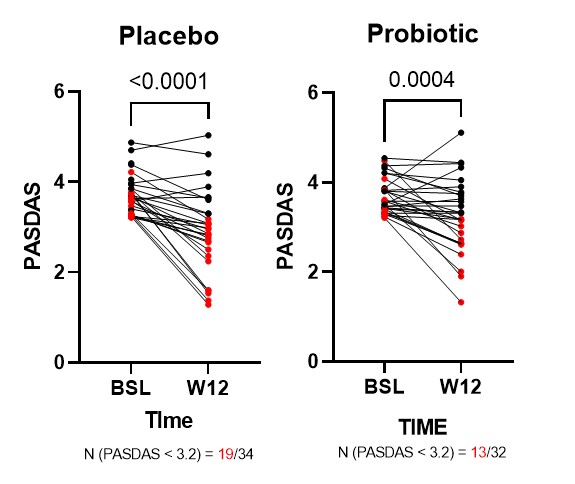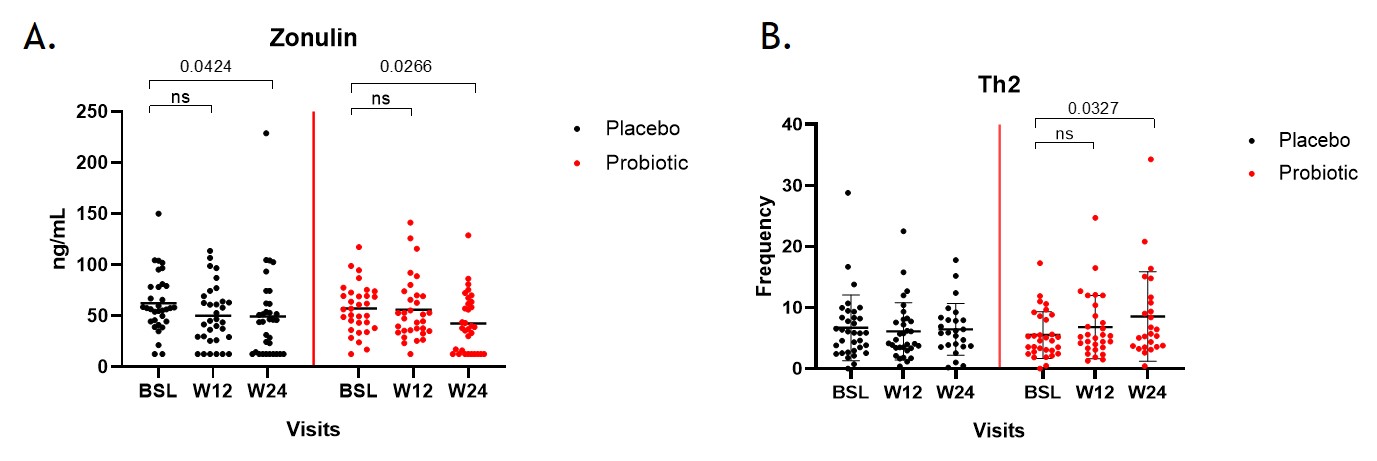Session Information
Date: Sunday, November 12, 2023
Title: Abstracts: Spondyloarthritis Including Psoriatic Arthritis – Treatment I: PsA
Session Type: Abstract Session
Session Time: 2:00PM-3:30PM
Background/Purpose: Psoriatic Arthritis (PsA) is a painful disease of the joints and spine. Recent studies have described enteric dysbiosis as a possible pathological mechanism in PsA and hence could be a target for therapy. In an open label pilot study, probiotic supplementation ameliorated enteric dysbiosis and reduced disease activity of PsA patients. The aim of this study was to test the effect of probiotic supplementation on disease activity in PsA in a larger randomized controlled trial (RCT).
Methods: The study was designed as a single center, double-blind, RCT (NCT04588623) on consecutive patients with PsA in Moderate Disease Activity (MoDA) (Psoriatic ArthritiS Disease Activity Score [PASDAS] >3.2 – < 5.4) under stable treatment. Patients were randomized to either placebo or probiotic containing Bifidobacterium and Lactobacillus strains (OMNi-BiOTiC® STRESS Repair, Institut Allergosan, Graz, Austria) for 12 weeks. After week 12 (W12) patients received probiotics, irrespective of the initial grouping and were followed up again at week 24 (W24). The patients enrolled were given a full clinical assessment and samples (stool, serum, and PBMCs) were collected at baseline (BSL), W12, W24. Immune cell composition in the peripheral blood was analyzed using flow cytometry. Stool microbiome was analyzed via 16s rRNA sequencing and levels of Zonulin, Calprotectin and Anti-Trypsin were assayed through ELISA as a measure of gut permeability and intestinal inflammation. The primary end point of the study was the reduction of disease activity to low DA or remission (PASDAS < 3.2) at W12.
Results: A total of 65 patients were recruited and off these 32 patients were randomized into the probiotic group and 34 patients into the placebo group. A significant reduction in disease activity was observed as measured by the PASDAS score in both groups irrespective of probiotic intervention (Fig1). The proportion of patients reaching low DA or remission was not different between probiotic and placebo (55.8% vs 40.63%). A significant reduction in zonulin levels was observed in the probiotic group at W24 compared to BSL, whereas only a slightly weaker effect was seen in the placebo group (Fig2A). Results from immune cell phenotyping, revealed a significant increase in the frequency of Th2 cells in the probiotic group at W24 (Fig2B). No significant differences were observed in the frequencies of other lymphocyte subsets like Th1, Th17 and Tregs.
Conclusion: In this double-blind RCT, supplementation of probiotics in PsA patients showed limited effects on the dysbiosis of the gut measured by marker Zonulin and also had minor effects on the T-cell composition. However, no difference was seen in the amelioration of disease activity compared to placebo treatment, which could be due to the small samples size and the short recording period of the trial.
To cite this abstract in AMA style:
Muralikrishnan A, Dreo B, Lackner A, Husic R, Moazedi-Fuerst F, Hermann J, Bosch P, Fessler J, Thiel J, Stradner M. The Effect of Probiotic Modulation of Enteral Dysbiosis on Disease Activity in Patients with Psoriatic Arthritis – A Randomized Controlled Trial [abstract]. Arthritis Rheumatol. 2023; 75 (suppl 9). https://acrabstracts.org/abstract/the-effect-of-probiotic-modulation-of-enteral-dysbiosis-on-disease-activity-in-patients-with-psoriatic-arthritis-a-randomized-controlled-trial/. Accessed .« Back to ACR Convergence 2023
ACR Meeting Abstracts - https://acrabstracts.org/abstract/the-effect-of-probiotic-modulation-of-enteral-dysbiosis-on-disease-activity-in-patients-with-psoriatic-arthritis-a-randomized-controlled-trial/


